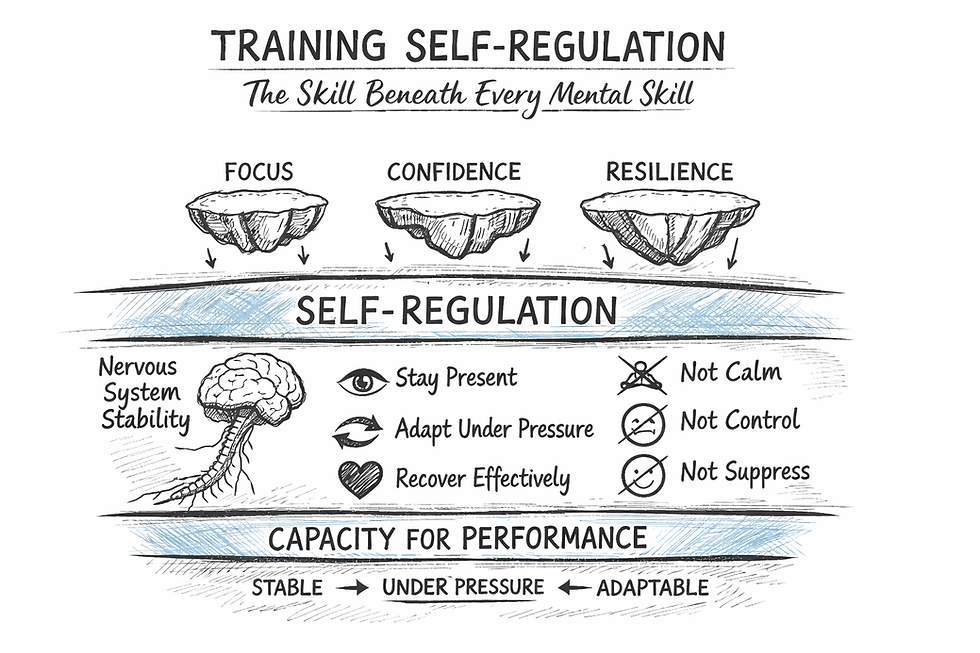From Mind Games to Mental Mastery: How to Break Free from Self-Doubt and Compete with Clarity
- Kate Allgood
- Apr 17, 2025
- 3 min read
Self-doubt is a silent opponent that can sabotage even the most prepared athlete. It creeps in during crucial moments, whispering thoughts of inadequacy and planting seeds of fear. Whether it’s before a big game, after a mistake, or in the quiet moments of practice, self-doubt can erode confidence and hinder performance. The key to overcoming it? Developing the mental skills to become aware without attachment—to notice those negative thoughts without letting them control your actions.
The Sabotaging Power of Self-Doubt
Self-doubt isn’t just a passing thought—it’s a mental habit. When left unchecked, it can become a cycle of negativity that disrupts focus and drains energy. Negative self-talk like “I’m not good enough” or “I always mess up under pressure” shapes your perception and affects how you perform. The real power comes from how attached you are to those thoughts. The more you identify with them, the more they impact your game. Instead, practice detachment—recognizing the thought without letting it take root.

How to Break Free from Self-Doubt and Compete with Clarity
1. Become Aware Without Attachment
Awareness is crucial, but it’s only half the battle. The real key lies in noticing your thoughts without getting entangled in them. Let them surface without judgment or resistance, and then let them go.
Drill: During practice or a game, when self-doubt arises, take a deep breath and simply acknowledge the thought: “There it is.” Don’t analyze it or react to it—just notice it and let it pass.
2. Use a Mantra to Reclaim Your Focus
Once you’re aware of the thought and have created some space from it, redirect your attention to what truly matters. A mantra or simple phrase can help ground your focus and remind you of your purpose.
Drill: Choose a mantra like “Stay present” or “I compete with clarity.” Repeat it when self-doubt creeps in, pairing it with a deep breath to reinforce your intent.
3. Mental Rehearsal for Detachment and Clarity
Visualization helps you mentally rehearse not just success but also how you’ll handle challenges. Picture yourself in a situation where doubt arises. See yourself noticing the thought, letting it go, and then anchoring to your mantra.
Drill: Spend 5-10 minutes visualizing how you’ll respond when negative thoughts appear. See yourself detached from the thought, calmly redirecting your attention to your next move.
Final Thoughts: Mastering Your Mind Through Detachment
Mental mastery isn’t about eliminating every negative thought—it’s about detaching from them so they lose their grip. The more you practice this skill, the more resilient you become under pressure. Stay aware, stay detached, and let your focus be guided by intention rather than fear.
Remember, your thoughts don’t define you. Own your attention, master your mindset, and compete with clarity and purpose.
Own your attention. Unlock your potential.
Kate
Kate
About: Kate Allgood is educated in the field of applied sport psychology. She holds two Masters degrees in psychology where she graduated with distinction. After a very successful hockey career, she has spent the past 14 years working one on one with high school, college, Olympic, and professional athletes to help them with their mindset, mental performance and mental skills training. Kate has also been a consultant for professional teams, including the Anaheim Ducks primary minor league affiliate the San Diego Gulls, to help the team and players develop their mental game. It is important to note that while Kate has graduate school training in applied sport psychology and general psychology, she does not diagnose or treat clinical disorders, and is not a licensed psychologist.
**The information provided is not to dispense medical advice or prescribe the use of any technique, either directly or indirectly, as a form of treatment for physical, emotional, or medical problems, without the advice of a physician. The information provided is only to offer information of a general nature to help you in your quest for high performance. If you know or suspect you have a health problem, it is recommended you seek your physician's advice.



Comments